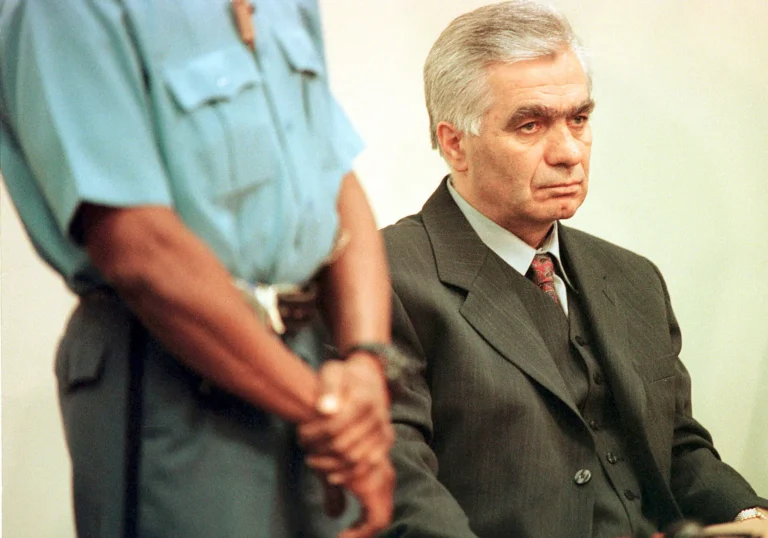A senior wartime leader of Bosnian Serbs, Momcilo Krajisnik, was sentenced yesterday to 27 years in prison for his role in the violent campaign to turn large parts of Bosnia into an ethnically pure Serbian region.
Judges at the war crimes tribunal in The Hague concluded that Mr. Krajisnik had played a crucial role in that campaign during the Bosnian war, and they convicted him of crimes against humanity.
But they acquitted him of two counts of genocide for lack of evidence, which was seen by some lawyers as a major setback for the tribunal’s prosecutors.
The verdict and sentence drew angry reactions from both Serbs and Bosnian Muslims. Serbs cited the punishment as further proof of what they called the tribunal’s anti-Serb bias. Muslims said that the failure to find genocide and to impose a longer sentence was an affront to the many war victims.
The war in Bosnia, which claimed 100,000 lives, was one of several that tore apart Yugoslavia in the 1990’s.
Mr. Krajisnik, 61, is the most powerful politician to have been convicted by the United Nations court dealing with the former Yugoslavia. An economist by training, and an ardent Serbian nationalist, he became the right-hand man of Radovan Karadzic, the Bosnian Serbs’ wartime leader, who remains a fugitive. Some witnesses at his trial said that Mr. Krajisnik was more focused and effective in organizing ethnic purging of territory claimed by the Bosnian Serbs than his more flamboyant boss.
Mr. Krajisnik wielded his power in a range of positions, as president of the Bosnian Serbian Parliament, as a member of the Bosnian National Security Council and as a board member of the Serbian Democratic Party. Prosecutors said that one of his main functions was to coordinate and oversee the brutal ethnic separation campaign carried out in 37 Bosnian townships. Judges found him guilty of deportations, forced transfers and persecution as well as murder and extermination of Croats and Bosnian Muslims.
Some lawyers following the proceeding said that the judges’ ruling could point to similar difficulties in proving genocide in the case of Mr. Karadzic should he ever stand trial. While not doubting that genocide occurred in Bosnia, some experts also say that prosecutors did not provide the required evidence to get a genocide conviction of Slobodan Milosevic, the former Serbian leader, who died during his trial earlier this year.
A conviction for genocide, the gravest of all crimes, specifically requires proving an accused’s intent to destroy, in whole or in part, a national, ethnic, racial or religious group.
”There is often a thin line between the crimes of deportation, persecution, extermination, which were all admitted here, and the intention to commit genocide,” said Heikelina Verrijn Stuart, a lawyer following procedures at the tribunal. ”In this case the judges drew the line, saying they did not get enough evidence that the genocidal intent existed.”
One measure of the importance the three-judge panel accorded the case was the length of the final ruling, at almost 450 pages. The trial lasted more than 30 months and testimony was heard from more than 120 witnesses. Mr. Krajisnik testified for weeks in his own defense, claiming he was unaware of any crimes and instead was a peacemaker.
At the hearing yesterday, with Krajisnik family members present in the public gallery, the presiding judge, Alphonse Orie, read only a summary of the judgment.
”The crimes were committed over a long period of time, often through brutal methods, with hatred or appalling lack of concern,” the summary said. It said the crimes ”constituted the actus reus of genocide,” that is, when taken together they were acts of a genocidal nature.
In a telephone conversation, Anton Nikiforov, a spokesman for the prosecution, said it was too early to say if the prosecution would appeal the verdict. ”We have 30 days to review our options and we are studying the verdict,” he said.
Former diplomats and witnesses for the prosecution in the past have stressed the central role Mr. Krajisnik had played in the Serbs’ campaign. When he participated in peace talks during the war, some diplomats gave him the nickname of Mr. No because of his unyielding stand.



